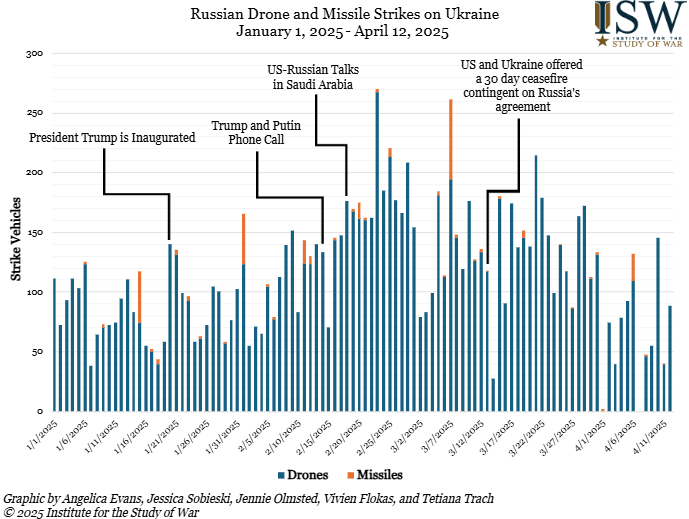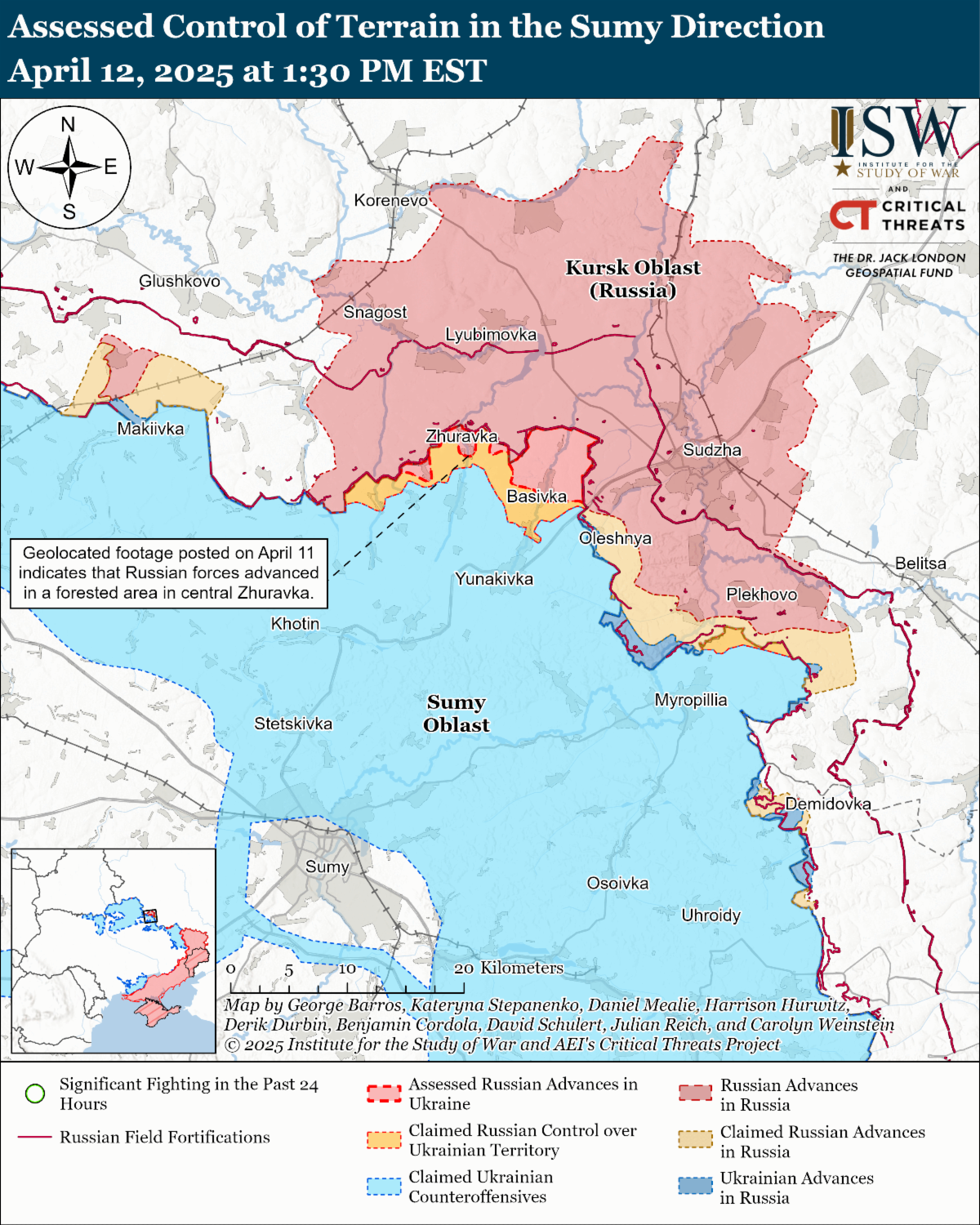US Special Envoy to Ukraine General Keith Kellogg expressed support on April 11 for the deployment of an allied "reassurance force" in rear areas of western Ukraine after a possible future ceasefire between Ukraine and Russia. The Times reported on April 11 that Kellogg expressed support for a "partition" of Ukraine between European, Ukrainian, and Russian forces; the deployment of a European "reassurance force" in western Ukraine; and establishing an 18-mile-wide "demilitarized zone" along the current frontline. Kellogg clarified later on April 11 that he supports the presence of a "reassurance force" that does not include US troops to support Ukrainian sovereignty, but that none of his statements during the interview suggested "a partitioning of Ukraine." Kellogg noted that the Times misrepresented some of his statements referencing possible areas of responsibility (AORs) of a future European "reassurance force."
Kellogg's clarification regarding the deployment of a "reassurance force" in Ukraine's rear areas is consistent with several statements from Ukrainian and European leaders about a possible future peacekeeping contingent deployed to Ukraine. Ukrainian Commander in Chief General Oleksandr Syrskyi stated on April 9 that a putative peacekeeping contingent would not deploy to the frontline. European Commission Vice President Kaja Kallas stated on April 10 that a future peacekeeping contingent would be likely to deploy not to the frontline but rather deeper within Ukraine or even outside of Ukraine. Bloomberg reported on April 10 that UK Defense Secretary John Healey and French Defense Minister Sebastien Lecornu stated that the Coalition of the Willing aims to develop more detailed plans within the next two weeks about how the coalition will help secure Ukrainian airspace, coastline, and land. People familiar with the matter told Bloomberg that the coalition hopes that the United States will agree to "backstop" any future European deployments to Ukraine with air power, border surveillance, and intelligence.
Russian state-owned and pro-Kremlin media amplified a Russian official's blanket rejection of any peacekeeping force in Ukraine on April 12. Russian Ministry of Foreign Affairs (MFA) Ambassador-at-Large Rodion Miroshnik responded to Kellogg's statements on April 12 and reiterated the Kremlin's objection to the presence of any peacekeeping contingent in Ukraine following a possible future ceasefire or peace agreement because a peacekeeping force would preserve the "level of toxicity" that supposedly prompted Russia to launch its full-scale invasion of Ukraine in February 2022. Russian state-owned and pro-state media widely amplified Miroshnik's statement. Kremlin officials have repeatedly rejected the idea of a possible future peacekeeping force in Ukraine or any European involvement in post-war Ukraine. Miroshnik's accusation of "toxicity" in Ukraine is an indirect reference to the Kremlin's continued demands that any conclusion to the war in Ukraine must address Russia's so-called "root causes" of the war. Russian Foreign Minister Sergei Lavrov previously defined Russia's perceived "root causes" of the war as NATO's alleged violation of obligations not to expand eastward and the Ukrainian government's alleged discrimination against ethnic Russians and the Russian language, media, and culture in Ukraine. Russian officials frequently directly invoke these "root causes" to justify Russia's continued war effort and pre-war demands amounting to total Ukrainian capitulation, and Miroshnik's April 12 statement is an indirect restatement of this concept.
Russian forces have resumed a more typical strike pattern in late March and early April 2025 after a temporary spike in the size of Russian long-range strike packages in mid-February and early March 2025. Russian forces conducted notably larger strike packages in mid-February and early March 2025 but have launched strike packages more comparable to trends last observed in January and early February 2025, albeit using fewer missiles, in recent weeks. Russian forces notably conducted no strikes against Ukraine on April 7 - the day after conducting their largest strike in over a month on April 6 — but have since resumed daily strikes. Russian officials have thus far refused to engage with or have outright rejected the US-Ukrainian temporary ceasefire that US Special Envoy for the Middle East Steve Witkoff presumably proposed to Russian President Vladimir Putin during a meeting on March 13. The proposed long-range strikes ceasefire on energy infrastructure would not require Russia to cease all long-range drone and missile strikes, but the proposed general ceasefire along the current frontline and in the air and sea would likely require Russia to end all strikes on Ukraine. Russian forces are likely delaying negotiations on a general ceasefire in order to continue making gains along the frontline in Ukraine and continue devastating long-range strikes against Ukrainian defense industrial and civilian areas in order to intimidate civilians and undermine Ukraine's ability to defend itself against future Russian aggression.
Key Takeaways:
- US Special Envoy to Ukraine General Keith Kellogg expressed support on April 11 for the deployment of an allied "reassurance force" in the rear areas of western Ukraine after a possible future ceasefire between Ukraine and Russia.
- Russian state-owned and pro-Kremlin media amplified a Russian official's blanket rejection of any peacekeeping force in Ukraine on April 12.
- Russian forces have resumed a more typical strike pattern in late March and early April 2025 after a temporary spike in the size of Russian long-range strike packages in mid-February and early March 2025.
- People's Republic of China (PRC) military officials reportedly visited the frontline in Ukraine to glean insights for future warfare amid reports that at least 155 Chinese nationals are fighting in Ukraine.
- Ukraine’s European partners announced additional military aid packages within the context of the Ukraine Defense Contact Group (the Ramstein format) meeting on April 11.
- Ukrainian forces recently advanced near Kurakhove, and Russian forces recently advanced in Sumy Oblast and near Toretsk and Pokrovsk.
| 





 [ISW] 러시아의 공세 캠페인 평가, 2025년 4월 11일
[ISW] 러시아의 공세 캠페인 평가, 2025년 4월 11일